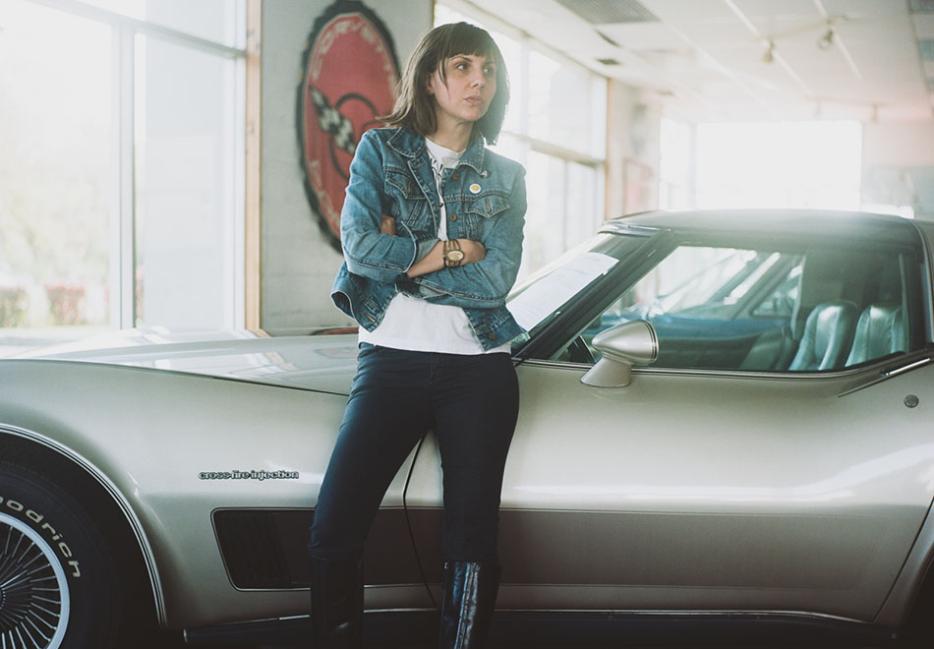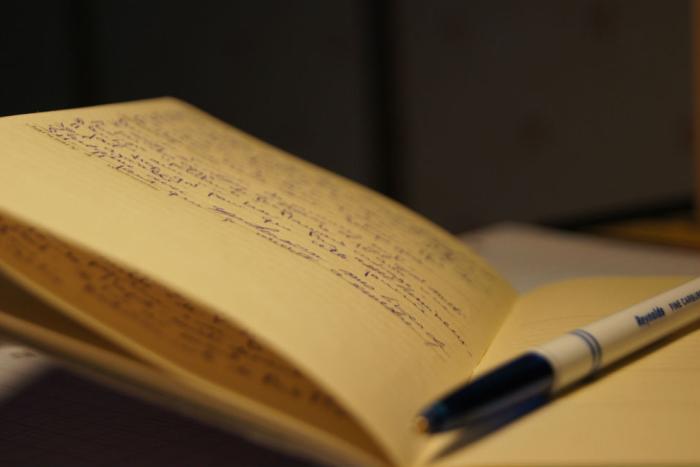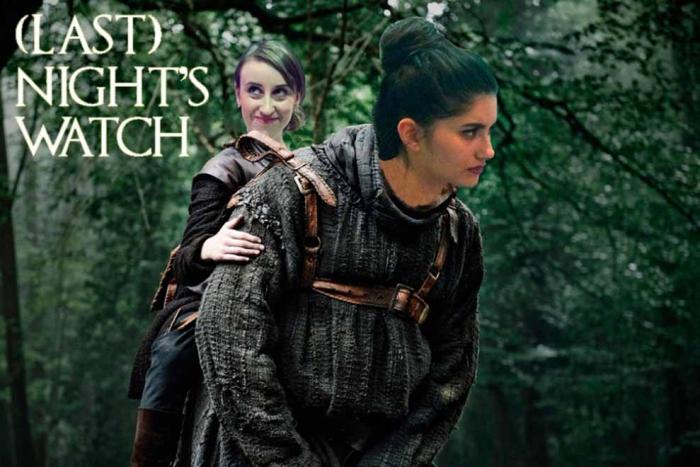Appropriately enough, when I call her for our interview, Jessica Hopper is trying to find a box that fits. The Chicago-based writer is days away from moving to the ’burbs with her partner and two kids (“And that was the sound of my remaining punk cred dying,” she says), so while we talk, she’s rifling through the free-box selection beside a clothing store and picking up packing materials at the local table-tennis emporium.
Hopper’s quest may be pragmatic, but it’s hard not to leap on the easy metaphor: as one of the loudest female voices in contemporary pop criticism, she’s spent years trying to carve out a space that can contain her multitudes. That process is documented in her new book, The First Collection of Criticism by a Living Female Rock Critic, a compendium of her writing from her earliest days working on teen punk fanzines to her more recent work for publications including SPIN and The Village Voice. The title, which began as a joke, is depressingly true (with one minor exception she discovered only recently): in the 60 years since Chuck Berry invented rock ’n’ roll, no woman writing about music has been given license to release a full book of her own reflections.
While Hopper is a fixture in this realm—she’s the senior editor of Pitchfork, the editor-in-chief of its print spinoff, The Pitchfork Review, and the former music editor of Rookie—she feels conflicted about her status as a pioneer. “There are many people who are more important, who are 20 years further into their careers, who deserve to have their work assembled and chronicled in one place,” she says. “Especially the critics whose work is languishing on the other side of the digital divide.” Still, she’s seized on this opportunity to plant a flag for the cause and issue a thunderous “Fuck you!” to the embedded misogyny within rock criticism and our culture at large.
*
The book opens with a disclaimer where you pay tribute to other essential works by feminist critics: Rock She Wrote, which was co-edited by Ann Powers and not actually a collection by a single person, and Beginning to See the Light, by Ellen Willis, which isn’t strictly a book of criticism. But your title is still a clear provocation.
I was at EMP, the Experience Music Project Pop Conference, a few weeks ago, and I had the extreme pleasure—and this is not just a namedrop, it's part of the actual story—of giving copies to Greil Marcus and Robert Christgau in person. I know them professionally, socially. They both told me, “I love the title. I appreciate the title!” Christgau said, "It's a very true title." Of course, 20 minutes later, he came back and said, “Okay, actually, there was one, and it was called Trips, and it came out in 1972 and was out of print by '73. But no one's gonna think of that.”
[To a passer-by] Yeah, I know that's the entrance. I'm just getting a box. Thanks, though.
Whoa. Weird encounter. I know that this weird hole in the wall where they keep the free boxes is not the entrance to the Western wear store, thanks. Okay, this is what it's like being a woman. A dude who is clearly crazy just mansplained to me what I was doing. Yes, I understand this cardboard box is not a door! You can never be an expert, Sarah! As long as you present as female, you can't be an expert. Right there, that’s the title of my book.
You worry about the erasure of other people's work. So that's why I included that page, which is a dedication and a disclaimer at the same time.
And yes, the title is a total fuck-you, and there were a lot of times where I was told that this book could not exist because there was no precedent. And of course, precedents have to be gendered. It's bullshit! You know it's bullshit. Am I womansplaining to you?
I'm interested in Christgau's response. I think you and I had similar responses to the amount of fucking—especially in his recollections of Ellen Willis—in his own memoir, Going Into the City, which came out not too long ago.
In big-tent feminism right now, I feel like we're all rallying to support each other's work, to have that space set for us at the table. We still need that because of how we record women's creative work.
It's nice that he was receptive to your collection, though.
I think a lot of people had reactions to Christgau's book that he may not have been entirely expecting. I know Lisa Robinson has a memoir out [There Goes Gravity: A Life in Rock and Roll], but so much of it is the opposite of Christgau's: she was so tight with John and Yoko, and she was in the inner circle with Bowie and Lou Reed at the absolute pinnacle of their careers. But I read that book and thought, "Yeeeeeah, I know all this stuff about John and Yoko, but what was her experience of doing this?" I’m so desperate for every woman I know—I want the chronicle of their careers, I want the chronicle of their work, I want the sheer visibility of it. Look at what Roxane Gay did with Bad Feminist. There were people going, "Oh, but it's full of essays that were already published." Well, yeah. And if I'm not mistaken, it's a bestseller. Look at what that opens up. In big-tent feminism right now, I feel like we're all rallying to support each other's work, to have that space set for us at the table. We still need that because of how we record women's creative work.
Let’s talk about role models. In the book, you bring up your experience of being a teenager and performing “grunge” to impress a dude—wearing Mudhoney t-shirts, scrawling tributes to Dinosaur Jr. on your shoes—before you'd actually wrapped your head around it.
Yeah, my performative grunge career, which lasted a lot longer than it should have, I'm sure.
When I fell into writing about music, I asked a senior editor for advice about which critics I should study, and he just said, “I don't read any music criticism; my only influences are Raymond Chandler and noir fiction.”
Well, because that dude was born with permission to do what he wanted to do.
Where did you find that permission?
I just read a lot. I read the papers that my mom worked at and helped make. She was at alt-weeklies. I picked up City Pages, which was our weekly. At the time, a woman named Terri Sutton was there, and she was big shit in music criticism at the time. I remember she reviewed Marianne Faithfull's memoir, Faithfull, and she said, basically, “Her story is as important as the Stones'.” I said, "Fuck, yeah!" and went out and bought the book immediately. I probably ditched school.
Because that was some of the first criticism I read, I just assumed the world was swimming in feminist music critics, at least initially. I'm not an idiot, I know patriarchy has the power at all times, so I knew that we were kind of in the margins, but all around me I saw women who were making that space, who were running magazines and fanzines and local music monthlies. Minneapolis, where I grew up, is kind of a special city in that way. We had three different punk scenes thriving at the same time that were totally separate. I thought every city was that punk, but it was just Minneapolis in the '90s.
Then [when I found] Riot Grrrl, it put a name on how I felt: radical punk-rock feminism. It was so enthralling and intense. I remember I interviewed Kathleen Hanna at the Bikini Kill show on the first U.S. tour and I got a copy of Bikini Kill no. 2 from her—I mean, this indicates how old I am, really—and the next day, I replicated her onstage outfit as closely as I could. It required thrifting a garter belt after school.
It took a few days [to read it] though. I remember looking at it and thinking, “I’m not ready to crack this open.” Because I knew if just seeing them play, if just getting to interview her in the most fawning, sad teenage way with my dumb, wacky questions for half an hour, with her willingly entertaining it, if that had completely shifted my life, what would happen when I read all this stuff by women who were what I wanted to be? That was going to blow the fucking doors off. I couldn't even pick it up. I was so freaked out because I knew it was going to change everything.
It feels like there’s been a real shift within music criticism within the past half-decade. When I started, in the early 2000s, I had the (not unwarranted) sense that I was one of only two or three female music writers in Canada—and the only queer woman within that group. Compared to back then, I’ve noticed a heartening diversity of opinion and perspective and voice over the past while. It seems too simplistic to just attribute that to blog culture, and I think you can take a lot of credit for expanding the roster of critics and the tone of the content at Pitchfork. But beyond blogs and your own influence, what do you think has brought it about?
I’ve noticed this as well, and I think some of the initial wave—and this is pure pseudo-science, here—was editors who were hip-hop fans and realized that a bunch of white dudes were not going to give them the insight they needed on certain artists. There were a lot of folks who came up amid Riot Grrrl, [who absorbed] ’90s hip hop consciousness, et cetera, who did not want to be part of the problem, and so they started opening doors.
But I think a fair amount can be attributed to Tumblr and blogs. Twitter a little less so—though look at someone like Meaghan Garvey, a writer I work with near-daily now (#blessed) at Pitchfork. She was mostly doing illustrations and being great at Twitter and kept a Tumblog, and then she did this fantastically sharp piece for Vice, like, two years ago, and the next day, my editors at Spin were like, “She’s from Chicago, do you know how to reach her?” I think smart editors know that having a writer with personal perspective means you have a better chance of getting it right. You want to put up pieces everyday that make people say “FUCK, YEAH” when they read them. And by you, I mean me.
Semi-related, but more specific to you: when you parsed your own writing, did you pick up on any notable shifts that took place within your voice or interests as a critic over time?
Yes. It was gratifying. Working at the Chicago Reader, the first year that I went full-time freelance, the first few pieces, all the ledes drew from personal experience, and probably started with “I”. By the end of the year, I knew how to drive a line from A to B without having to involve my own experience. I was very excited when that happened, when I could just speak AS THE CRITIC.
Were there any words or phrases that recurred in your writing to the point where you were like, “Wow, I guess that's one of my trademark ‘things’?”
I started a list. And I did a "search + replace" through the book and fixed it and kept the list so I never repeat them ever again, but the contents of that list are my own shameful secret.
Did anything catch you off guard?
Other than a feeling of deathly embarrassment? I started publishing my work at 15. Thank god it wasn't LiveJournal, that it was a Xerox that probably mouldered away in someone's basement. I really did think that this book was going to be, like, four pages long, because my work is garbage and I'm an idiot and I was not the teen genius. I was not the Tavi of my day.
I knew if just seeing them play, if just getting to interview her in the most fawning, sad teenage way with my dumb, wacky questions for half an hour, with her willingly entertaining it, if that had completely shifted my life, what would happen when I read all this stuff by women who were what I wanted to be?
Does writing about music still hold the same thrill it held when you started doing it two decades ago? Are you able to adequately cover all the real-world issues that are important to you?
I love the challenges of doing proper journalism. I really, really would love to do more profiles than I get to do. [I love] getting at the nut of the story, the art, the machination. My Björk story was a treat in that regard, in terms of behind-the-curtain candour and access—but also stuff like the piece in the book about music in commercials, which I reported for 11 months, on and off. Of course, who doesn't want to be writing GQ cover stories? That’s not my training, so there are still a lot of challenges there. Not that criticism is easy. For me, it’s a little more rare that I find records or artists these days that hold the kind of water I want them to in regards to the kinds of theories I want to dig in on.
Have your core tastes changed over time?
Once I had kids, I found it hard to listen to hardcore. What I want out of rap these days seems to have had a pretty serious shift. The digital fry of contemporary mastering—Google “loudness wars”—gives me a headache after about an hour, so I have to temper it with older music. I think teen-punk me would be rudely disgusted that I appreciate Steely Dan as much as I do now.
You’ve included a review of Cat Power’s Sun near the end of the book, and I found myself lingering on this sentence: “You can hear the fight to be understood, to show us not who she was, but who she is ... Sun is a spirited violation of what we think we know about her, content to show us a different kind of discontent." Do people have misconceptions about you as a critic that are predicated on who you used to be?
Sure, though I’ve never been super invested in being understood, per se—in part because I know that the people who are eager for the perspective I offer in my work, they’ll find it. I’m lucky that way. And I have always accepted that as a feminist, as someone who is ambitious, as someone who sometimes has really sharp-edged opinions that shoot from the margins of my work, my work will be maligned. If everyone understood my work, it would be a sign, for me, that I was doing it wrong.






